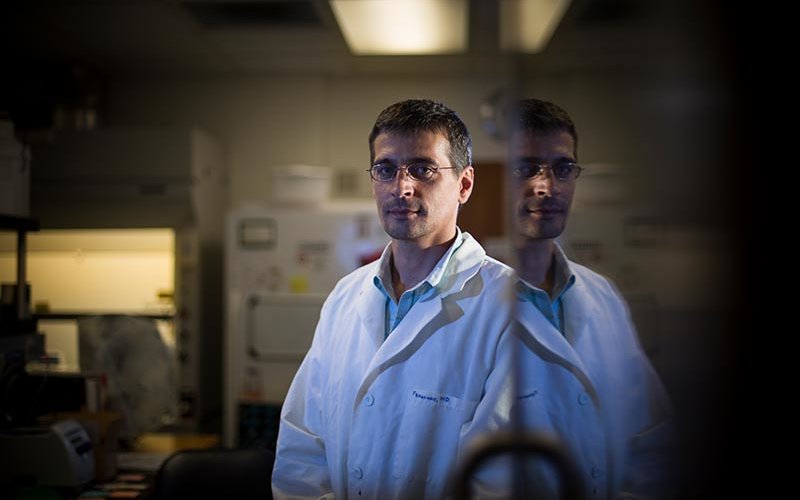
Completed in 2003, the Human Genome Project was an international, 13-year project that resulted in the DNA sequencing and mapping of all of the human genes. At a Wednesday, Sept. 25, faculty lecture at Pollak Library, Nikolas Nikolaidis, professor of biological science, will present “The Lessons 500,000 Human Genome Sequences Taught Us.”
Nikolaidis, a molecular biologist, will discuss the importance of the Human Genome Project and how information from DNA can be used to develop new ways to treat, cure or even prevent diseases.
The noon-1 p.m. talk in Pollak Library, Room 299, is free and open to the public, and culminates the “History of Our Genes: Human DNA” exhibit. Colleen Greene, digital literacy and marketing librarian, and Robert Tomaszewski, science and engineering librarian, curated the exhibit, which ends Sept. 25. It is the first of a series of talks showcasing faculty research this fall semester.
What is the focus of your lecture?
This talk is about the human genome sequence and the endless possibilities, applications and uses it possesses. Our genome is our genetic material, our DNA, and it is unique to each one of us. It is the operating manual containing all the instructions that guide our growth and help our organs do their jobs.
Why is it important?
It is of paramount importance for each one of us to understand, to some degree, the power of knowing our genomic characteristics. This knowledge allows us to understand how these characteristics result in diseases and how they affect the interactions with our environment. Our lifestyle, what we eat and how we live, can potentially alter our genome and these changes can have life or death consequences. Therefore, it is crucial for us to know who we are — genetically — and how our lifestyles can change the original instructions that our mom and dad’s DNA gave us.
What will people learn?
I’ll discuss how knowing our genome and how it actually works allows us to better understand human diseases and conditions. I’ll also describe the major efforts for personalized genomics and medicine, cancer genomics and the impact of genomics in our everyday lives. Additionally, we’ll deliberate some of the ethical and social issues and responsibilities that derive from this vast amount of knowledge. To paraphrase Francis Collins of the Human Genome Project: Our genome is a history book because it tells the story of our species’ journey through time. It is a workshop manual because it contains the blueprints for building every human cell. Lastly, our genome is an active-learning book of medicine because it provides health care professionals new ways to treat, prevent and cure diseases.